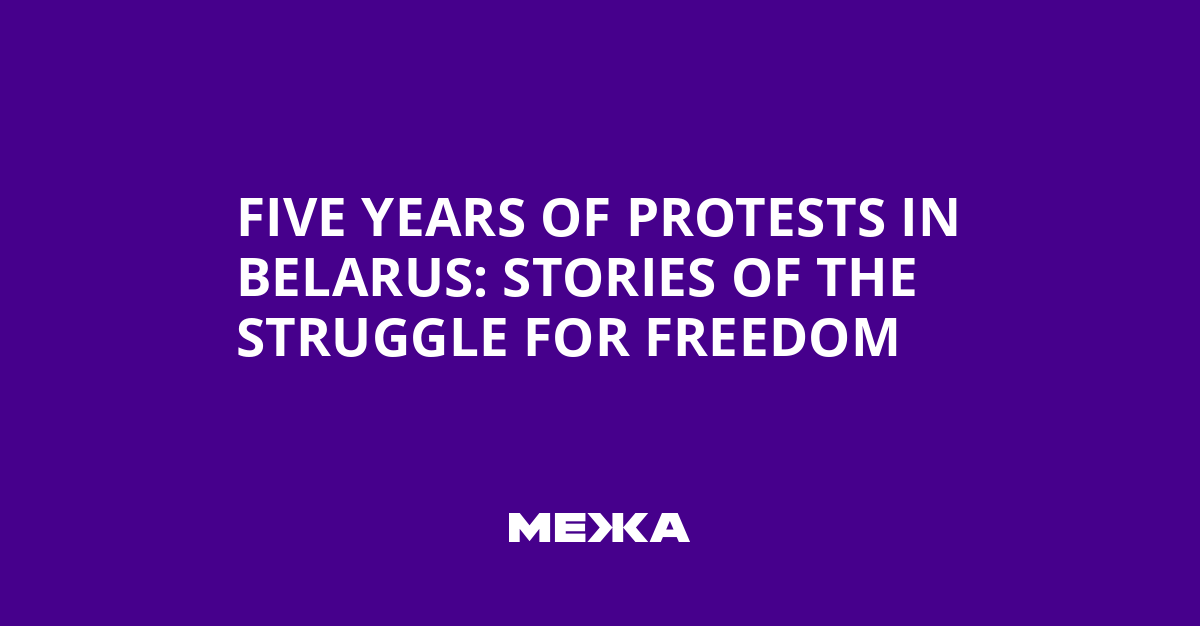As Anastasia Vasylchuk of the leading Belarusian human rights organization Viasna explains
Five years ago in Belarus, protests began after the announcement of Alexander Lukashenko’s victory in the 2020 presidential elections. People took to the streets with demands for fair elections, an end to political persecution, and a stop to excessive state pressure. The protests unfolded against a backdrop of arrests, torture, and escalating repression, but the movement for freedom did not break.
In the years since the events, more than 65 thousand people were arrested, and over 1100 political prisoners remain behind bars. The scale of migratory pressure forced hundreds of thousands of citizens to leave the country. In the turbulent foreign policy, the Lukashenko regime drew closer to the Kremlin, and Russia used Belarusian territory for a full-scale invasion of Ukraine in 2022. Since then, Belarusian society has continued to resist the occupier, joining initiatives of resistance and support for Ukraine.
To mark the five-year anniversary of the protests, we spoke with five Belarusians: a politician, a sociologist, a paramedic, a director of a banned theatre, and a journalist who recently gained freedom. They shared reflections on the events of 2020, the challenges, achievements, and mistakes of the movement, as well as on current Belarus and their place in it. All of them are now abroad and dream of returning home.
Pavlo Latushko: “I’m proud that Belarusians stood up for freedom”
Pavlo Latushko, former Minister of Culture and former Ambassador of Belarus, publicly supported the protest movement of 2020. After a series of detentions, he felt a sharp crisis of the regime and decided to speak out openly against the actions of the authorities.
“I was in shock and decided: enough, I will publicly oppose this government. I spoke in front of the theatre: I said that I was ashamed that Belarusians in uniform could commit such barbarism against other Belarusians. But I am proud that Belarusians stood up for freedom and there are so many of us.”
– Pavlo Latushko
He believes that the protesters could have acted more decisively, but factors such as preemptive arrests of leaders and lack of control over television made mobilization difficult. After Lukashenko’s threats, Latushko was forced to temporarily leave the country.
Regarding Russia’s full-scale invasion of Ukraine, Latushko emphasizes that Lukashenko became an ally of the Kremlin, providing territory for strikes against Ukraine, which shocked Belarusians and spurred new waves of protests. He calls for accountability for crimes against humanity and the deportation of Ukrainian children, and believes in the future of a democratic Belarus despite the difficulties.
Anastasia “Sever” Mahomet: from protest to war
Anastasia is a volunteer and former head of the medical platoon of the Kastus Kalinouski Regiment. During the protests she combined work at a medical facility with participation in actions. Persecution forced her to leave Belarus and seek new paths.
“In the summer I always sleep not at night, but during the day. After the vote I woke up after nine in the evening – and now everywhere they say that Lukashenko scored over 80%. I started hysterical laughter: if back then he had claimed that he scored 55%, I think Belarusians would have swallowed it. But here it’s over 80%, and you don’t know a single person who voted for him.”
– Anastasia “Sever” Mahomet
After the war she joined Ukrainian forces, worked as a medic in the zone of active hostilities, and is now considering changing her citizenship. Anastasia believes Belarusians need a show of force for systemic change of power and sees participation in the armed conflict as the only path to save the country.
Anton Radnyankov: struggle and exile
Anton Radnyankov – political scientist and sociologist, former member of the Coordination Council of the opposition. After his arrest and forced exile from Belarus, he discusses mobilization during the presidential race and repression against opposition forces.
“Mobilization in the cities was striking. In Belarus, to nominate a candidate for the presidency, you must gather 100 thousand signatures. Babaryko gathered 500 thousand – that’s a record in Belarus’s history.”
– Anton Radnyankov
He talks about his arrest, exile, and the shock at the start of the full-scale war. Anton believes that Belarusian society has shed a certain naivety but remains vulnerable to the influence of a neighboring country.
Marina Yakubovich: theatre and exile
Marina is an actress and director, a participant in the “Free Theatre,” which staged sharply social plays during the protests. In 2021 she was forced to leave Belarus.
“Until 2020 we had a stable and relatively peaceful life. But under dictatorship, any social problem becomes political. You cannot talk, for example, about alcoholism or queer issues, because that immediately becomes a political challenge.”
– Marina Yakubovich
Marina shares the arrests of colleagues, the closure of independent media, and her departure. She feels guilt that the war touched Ukraine but believes in the future of a democratic Belarus, while recognizing the gap between those who stayed and those who left.
Igor Karnei: journalism in prison and abroad
Igor Karnei, a former Radio Liberty journalist, spent almost two years behind bars on charges of collaboration with an “extremist” organization. In June 2025 he was released and taken to Lithuania.
“In 2020, Belarusians for the first time in many years felt themselves as one nation. Everyone became the enemies of the state. It was no longer existence, but life, because there was the awareness that sooner or later they might ‘come’.”
– Igor Karnei
He talks about the rise of repression against independent journalists, arrests and exile, as well as the losses and hopes of Belarusian society. Igor hopes to return home, though he understands that it will not be easy.
Five years on, the protests in Belarus left the country with a new history of the struggle for freedom and democratic values. Despite repression, exile, and division, Belarusians continue to draw on hope and shared goals, aiming for a future where human rights and freedom of speech remain the core values.
